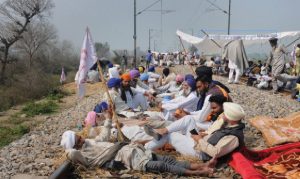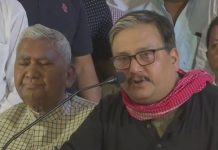 The spirit of federalism came under strain as the Punjab-Centre relations reached a flashpoint with chief minister Amarinder Singh leading a symbolic protest in Delhi on Nov 4 alleging step-motherly treatment from the Modi regime.
The spirit of federalism came under strain as the Punjab-Centre relations reached a flashpoint with chief minister Amarinder Singh leading a symbolic protest in Delhi on Nov 4 alleging step-motherly treatment from the Modi regime.
The trigger for Amarinder’s protest was the refusal of President Ram Nath Kovind to meet a delegation from Punjab where the chief minister wanted to flag the economic blockade being faced by the state due to stoppage of goods trains.
The trains had been halted by the Centre due to the widespread agitation of farmers who want the four central farm laws revoked.
The agitation by the farmers is not new and had taken place earlier in September when the Centre passed the four laws claiming it wanted to reform the agriculture sector.
The Opposition dubbed the central laws as anti-farmer. In protest, the Punjab government passed a set of state laws to negate the central laws. But these state laws had to be approved by the President of India before they became operational.
On his part the President pointed out that the state bills were still lying with the Punjab Governor VP Singh Badnore and he could do nothing till the papers reached him.
The farmers got impatient over the delay and again started agitating across Punjab by blocking roads and railway tracks. Alarmed over the situation the railway ministry stopped the movement of goods and passenger trains in the state.
 No goods trains meant the state went without coal for the power plants, no fertilizer for the wheat crop and could not move its food grains out. As Punjab stared at a blackout, Amarinder had little option but to take his protest to the national capital.
No goods trains meant the state went without coal for the power plants, no fertilizer for the wheat crop and could not move its food grains out. As Punjab stared at a blackout, Amarinder had little option but to take his protest to the national capital.
In a normal course a head of state gets to discuss important issues with the President just as the opposition leaders get time to petition the top Constitutional office if they have concerns over a central law.
Amarinder argued that he did not want to discuss the state laws with the President but wanted to highlight the severe power and agri crisis that had gripped the state due to blockade of goods trains by the centre.
However, the underlying tension between the state and the centre related to the farm laws passed recently by the Punjab Assembly to negate the central laws.
The central laws passed during the recent monsoon session of Parliament had riled the Opposition particularly Congress chief Sonia Gandhi who had announced that the party’s governments in Punjab, Rajasthan and Chhattisgarh will pass state laws to negate the “anti-farmer” central Acts.
Later, Congress leader Rahul Gandhi along with Amarinder and host of other party leaders had taken out a tractor procession to protest against the central laws.
While Punjab was the first state to open a front against the Modi government, Rajasthan under chief minister Ashok Gehlot too has passed a similar set of laws to negate the central laws. The centre is clearly not amused over the developments and has instead blamed the Congress’ of trying to block agri-reforms.
The centre argued that its laws will allow greater freedom to the farmer in selling his produce and will in the process empower the food producer. The Congress has dubbed the central laws as anti-farmer and claimed that they will only end up leaving the peasant at the mercy of rich corporate.
Incidentally, the BJP’s long time ally in Punjab the Shiromani Akali Dal, too had quit the NDA over the central farm laws terming them anti-farmer and taken to streets to score over the Congress.
Huge protests by various farmer organizations had erupted nationwide in September after the passage of the central laws but subsided in Punjab after the state passed its own laws to protect the farmers.
But there was a catch. As per Constitution, the state laws had to be approved by the President before they came into force.
The President pointed out to Amarinder that he had not received the papers which were still lying with Punjab Governor VP Singh Badnore forcing the chief minister to allege that the Governor was deliberately sitting over the files.
“We know that the (farm) Bills have not reached the President. It is still with the Governor… We had sent him the papers on October 20. He should have sent it to the President. The Governor has no role to play… You give it to him and he forwards it. He is a mere post-box in such matters. Why he hasn’t forwarded it we would like to know,” Amarinder Singh said. “We wanted to meet the President for different reasons. Because he is the head of our country and we wanted to tell him what the situation in Punjab is. That is our right…We hoped he would talk to the government,” he said.
The delay in negation of the central laws unnerved the farmers who revived their agitation in Punjab and squatted on the rail tracks to put pressure on the centre. A miffed Modi regime then stopped the goods trains loaded with coal and fertilizer from reaching the state citing safety concerns. Similar protests took place in neighbouring Haryana and in other states where farmers’ groups blocked roads.
The shortage of raw materials like coal for power plants and fertilizer for the wheat crop hit Punjab and induced losses to the exchequer as the state government was forced to buy electricity. “I have got nothing. With whatever money we have left, we are buying (power) from the national grid,” Amarinder said.
That the Punjab chief minister chose a battery of ministers, parliamentarians, legislators and party leaders to stage a symbolic one hour protest at Delhi’s Jantar Mantar on Nov 4 reflected the gravity of the situation. “This is step-motherly treatment meted out to us…our funds are being stopped. This is wrong…I hope the Central government will look at us in the same manner as it looks at its own states,” the CM said.
“Since March, we have not got GST dues. This is a constitutional guarantee that every quarter GST will be paid. I have got 10,000 crore pending and they are not paying me. And now they have stopped 1,000 crore of Rural Development Fund,” he said.
To make a point, the Punjab chief minister cited a precedent when former President Pranab Mukherjee had given assent to the Bills passed by BJP-ruled states under Article 254 (II) on suggestion from saffron party leader late Arun Jaitley.
But what was troubling Amarinder Singh more was the railway ministry’s decision not to allow goods trains through the state. Amarinder spoke to Railway Minister Piyush Goyal and
assured him that the Punjab Police would help the RPF maintain security at the stations and along the tracks to allow goods trains. But even that assurance did not ease the situation as the centre remained wary.
Another example of the centre-state tension was the last minute imposition of Section 144 barring assembly of five or more persons at Rajghat the memorial of Mahatma Gandhi by the Delhi Police which functions under the union home ministry just before Amarinder’s protest.
The Punjab chief minister had initially planned his symbolic protest at Rajghat but the venue was later shifted to Jantar Mantar in central Delhi due to the Section 144 at Rajghat. The Congress delegation paid tributes to the Mahatma and expressed the hope that the centre will take a compassionate view of the problems being faced by the people of Punjab as the state had made sacrifices for the country and had been the food bowl of the nation over the past several decades.
“Punjabis are deployed at the borders, fighting for the country, in many tough terrains and have given their blood to ensure the nation’s safety and security. No citizen of Punjab could ever think about indulging in any anti-national activity. We are all ready to give our blood for the nation, as we Punjabis have always done,” Amarinder said.
The Punjab chief minister warned the centre over the national security implications of the farmers’ agitation saying that failure to resolve the issue could lead to unrest in Punjab, which shares its border with Pakistan, and create a situation that may be exploited by both China and the western neighbour.
Amarinder flagged that Pakistan was regularly smuggling drugs and weapons for terrorists and gangsters into Punjab through drones. “If trouble erupts in Punjab, the entire nation’s security would be at stake,” he said.
Highlighting his concerns over the central farm laws the Punjab chief minister said that the new laws would destroy the established system of procurement and marketing of food grains through close-knit relations between the farmers, 75 percent of them being small and marginal farmers, and the commission agents.
Punjab with just 1.57 percent of the country’s population, contributes 40 per cent to the national food basket as part of a tried and tested system which the centre was trying to destroy for the sake of some corporate, Amarinder charged.
Pointing out how former prime minister Manmohan Singh protected the interests of the former Akali government in Punjab, Amarinder Singh said several Congress parliamentarians had requested meetings with Union ministers to end the impasse.
As things worsened, Punjab minister Sukhwinder Singh Randhawa, who is negotiating with the agitating farmers, alleged that the centre wants to create a law and order situation in the state. Randhawa further said that Punjab was heading towards a blackout as industry was shutting down, workers were losing jobs, farmers had no fertilizer for the wheat crop and all this could force the people to come out on the streets.
On the other hand, Railway Board chairman and CEO VK Yadav refused to run only goods trains and not passenger trains citing safety concerns due to the farmer protests as he acknowledged that protesters were sitting outside 22 railway stations, supplies to armed forces in Kashmir were affected and trains loaded with coal, petroleum products and fertilizer were waiting outside Punjab while those ready to transport food grains from the state were awaiting clearance.
The northern railway has suffered losses worth over 1,200 cr while the industry in Punjab has also taken a beating. The mounting centre-state tension then reached the doorstep of Union Home Minister Amit Shah who was briefed by Amarinder that the tracks in the state had been cleared. Besides the CM, the Congress MPs too urged Shah to intervene in the matter and diffuse the crisis. The BJP leaders too urged the centre to restore trains in Punjab.
Meanwhile, party politics played out as usual. Former minister Navjot Singh Sidhu, who had not been on best of terms with Amarinder, participated in the Delhi protest as praised the chief minister. While the SAD and AAP stayed away from the protest, LIP’s Simarjeet Singh Bains, Ekta Party’s Sukhpal Khaira, who is a suspended AAP MLA, and Shiromani Akali Dal (Democratic) MLA Parminder Singh Dhindsa joined the sit in.
Stunned over Punjab chief minister’s move, SAD chief Sukhbir Singh Badal took a swipe at Amarinder by terming his Delhi protest a ‘’luxury sit-in’’ and challenged him to rather hold an indefinite hunger strike outside Prime Minister Narendra Modi’s residence.
However, as public anger swept across Punjab, Sukhbir was forced to slam the centre over the economic blockade that was bringing hardships to the people. The matter has now reached the Punjab and Haryana High Court which has asked the Centre to file a status report by Nov 18. Irrespective of when the Punjab crisis gets resolved, the episode has shown that the centre must work closely with the states while dealing with sensitive issues and ensure that the spirit of federalism prevails in the country.
ABOUT THE THREE BILLS
Farmers are protesting The Farmers’ Produce Trade and Commerce (Promotion and facilitation) Bill 2020, The Farmers’ (Empowerment and Protection) Agreement of Price Assurance and Farm Services Bill 2020 and The Essential Commodities (Amendment) Bill 2020. The first bill allows trading of produce outside the Agricultural Produce Marketing Committee or mandis regulated by the states. The second bill provides for contract farming while the third deregulates the production, supply and distribution of food items like cereals, pulses, potatoes, onions and edible oilseeds.
letters@tehelka.com












